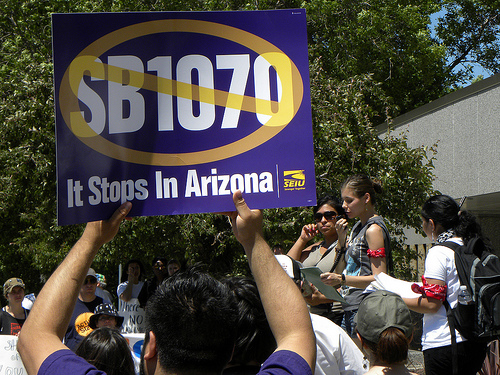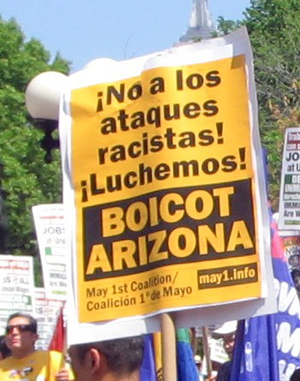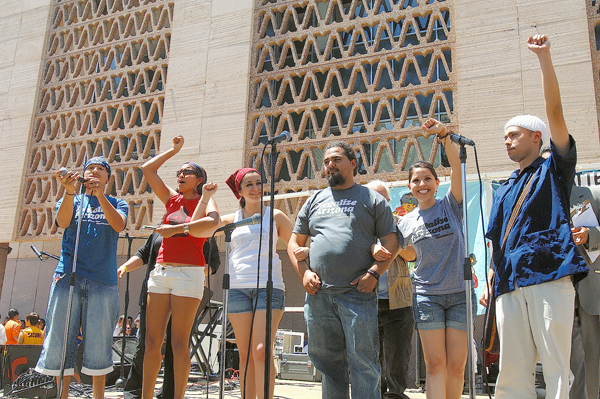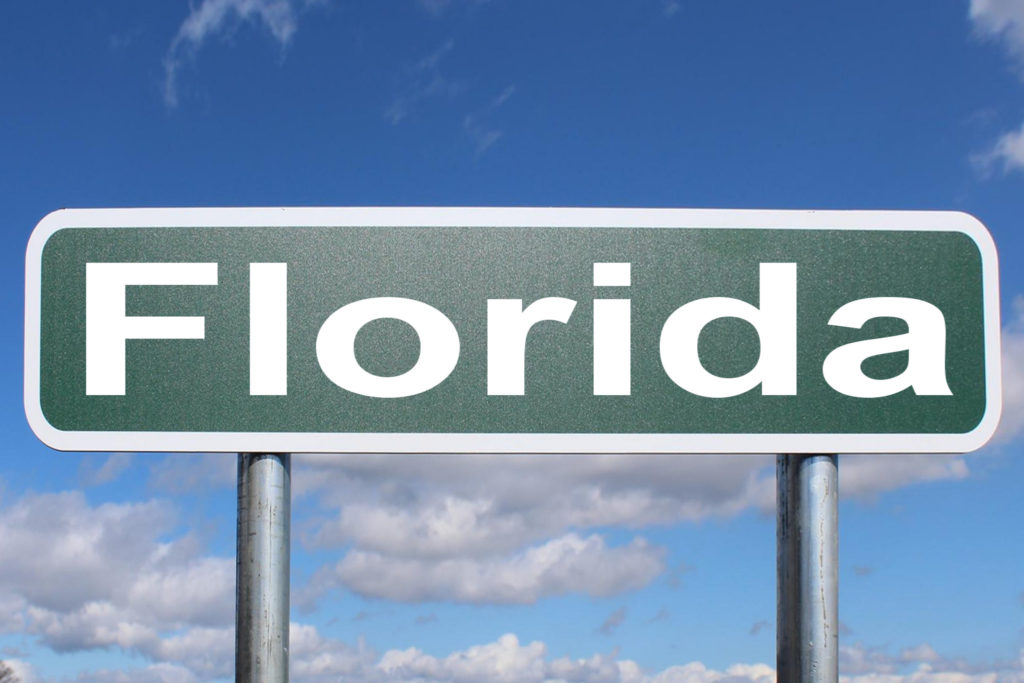This story was originally published by palabra, an initiative of the National Association of Hispanic Journalists
On June 1, Diego Dulanto Falcon, a 23-year-old immigration rights advocate, grabbed his Peruvian flag and spent the afternoon on the steamy pavements of Al Lopez Park in Tampa, Florida. Falcon, a DACA recipient protected from deportation by the Deferred Action for Childhood Arrivals program, joined other Latinos in peacefully protesting against Senate Bill 1718, the state’s newest anti-immigration law.
Despite Falcon’s best efforts and those of local immigrant rights groups such as WeCount! and the We Are Florida Coalition that had been mobilizing against the proposed legislation for months, SB 1718 went into effect on July 1, 2023, becoming the toughest state-led anti-illegal immigration law in the country in more than a decade.
The law, which began as a proposal by Republican Gov. Ron DeSantis, cracks down on unauthorized labor and imposes a series of immigration-related restrictions. Among other provisions, it criminalizes traveling across state lines with undocumented individuals; expands the E-Verify system, which allows employers to confirm that prospective employees are eligible to work legally in the U.S.; and invalidates certain out-of-state licenses issued to non-citizens and some visa holders.
Falcon comes from a mixed-status family that has lived in the Sunshine State for 19 years. Some of the proposals in earlier versions of the bill made them worry for their safety, and they had serious discussions about leaving. House Bill 1617, an earlier version of the proposed legislation, criminalized Floridians who shelter, support, and provide transportation to undocumented immigrants. While the harsher provisions of the original bill were modified to ensure its passage, Falcon felt that Florida Republican officials crossed a line. “They’re getting a lot more blatant and more offensive … like they’re just being a lot more forward with their attacks now,” he says.
‘A lot of people did pick up and leave.’
Falcon is getting ready to begin his first year of graduate school in public health at the University of South Florida, so his family has decided to stay –– for now at least. Coming from a low-income household, Falcon worries about the future of his family’s finances if they decide to leave. “I’m probably going to have to save up a lot of money and tank my credit score just to move across states,” he said.
However, for him, the sacrifice might be worth the sense of safety. “My credit will get better eventually, but my time here in Florida will not,” he added.
The chilling effect
It’s still too early to gauge the direct impact of SB 1718 on mixed-status families, but community leaders throughout the state have noticed a shift since the law passed.
“A lot of people did pick up and leave,” says Saman Movassaghi Gonzalez, managing attorney at Florida Immigration Law Counsel in Pembroke Pines. “There has been just an increase of fear. I would say that is the number one emotion that’s driving the situation.”
Gonzalez has been working to educate and provide clarity about the provisions of the new law, not only to undocumented families, but to multinational corporations, national employers and local organizations concerned about its effects.
In Central Florida, Laudi Campo, Florida state director for the nonprofit advocacy group Hispanic Federation, recalls a conversation with a member of her organization who owned a landscaping business. According to Campo, he sold everything and left the state. Campo says he called the Hispanic Federation after his departure and said, “I’m not going to take it … and my wife doesn’t have papers, so I’m not going to risk it.”
Felipe Sousa-Lazaballet is the executive director of Hope CommUnity Center in Apopka, one of the organizations involved in advocacy efforts that ultimately helped weaken earlier versions of SB 1718. “(In) our ESL (English as a Second Language) program, we’ve noticed that the number of students has been reduced this semester, less than what we had expected,” says Lazaballet. The Center reached out to the missing students and learned three families had already left Florida.
Echoes of Arizona

Political observers have made connections between the pushback against Arizona’s SB 1070 and a political change that was reported throughout the state in the aftermath. Photo credit: Fibonacci Blue/flickr)
The scope of the social and economic impact of the law will be unknown for some time, yet Floridians might look to Arizona for clues about potential ramifications. In 2010, Arizona’s SB 1070, also known as the “papers please” law, was a Republican legislative effort to get undocumented immigrants to self-deport or avoid traveling into the state. Within a year after it was passed, an estimated 100,000 to 200,000 immigrants left Arizona, an exodus that eventually led to economic consequences felt throughout the state.
‘There was no movement … there was no growth.’
The National Immigration Forum has reported that Florida’s law is also likely to have a detrimental effect on residents, institutions and key industries that rely heavily on an immigrant workforce. The Migration Policy Institute and the American Immigration Council estimate there are between 770,000 and 911,00 undocumented migrants living in Florida. At least 77% of them are Latino, according to a Migration Policy report. Without these undocumented workers, tourism, construction, and agriculture industries are among six key economic sectors that would lose up to 10% of their combined workforce, as stated in a report by the Florida Policy Institute, and Florida’s gross domestic product (GDP) would drop by $12.6 billion in a single year.
Changing travel plans
Days after SB 1718 was signed, the League of United Latin American Citizens (LULAC) released a travel advisory for the state warning Latino tourists in particular that they should “be cautious if they encounter law enforcement.” Shortly after, other civil rights groups issued similar advisories.
In 2022, Florida received 137 million visitors, a record for the state, according to Visit Florida, the state’s official tourism marketing corporation. A year prior, Florida visitors contributed $101.9 billion to the state’s economy, supporting over 1.7 million jobs. While it will take time to assess what, if any impact of SB 1718 or these travel advisories will have on the Florida tourism industry, some Florida organizations have been witnessing small shifts in revenue. AllTheRooms, a company providing vacation rental analytics, reported a drop in short-term rental revenue by nearly 35% in May 2023, compared to last year’s earnings. According to a Spectrum News 13 report, that same month, the tourism association VisitOrlando found a 26% decline in rental bookings through Airbnb over the previous year and overall occupancy for this year has dropped by 10%. July 4, one of the busiest days of the year for Walt Disney World, was the third-slowest day of the last 12 months at Disney’s Hollywood Studios, according to a report by Touring Plans. Thrill-Data, a theme park data collector, also found that this year’s Fourth of July holiday was the slowest for Disney Parks in the past 10 years.

Sign at a May Day Rally in 2010 in New York City. Photo credit: Cristina DC Pastor.
In 2011, a year after Arizona passed its own anti-immigration law, the state’s tourism industry suffered in the aftermath, including a total loss of $45 million in hotel and lodging revenue due to canceled conventions, according to the Center for American Progress. The losses rise to an estimated $141 million when accounting for food and beverage, entertainment, in-town transportation, and retail sales that an average conference attendee spends when visiting the state.
“There was no movement … there was no growth,” remembers Salvador Reza, a long-time Phoenix activist and community organizer. In 2010, as a leader speaking out against SB 1070, Reza played a pivotal role in organizing a people’s march with thousands of protesters, as well as the year-long campaign leading to a boycott of musical performances in Arizona, known as the “Sound Strike.”
The economic toll
Florida’s construction sector might also be looking at potential negative economic impacts as a result of SB 1718. Even before the law went into effect in July, a local CBS News affiliate in Miami spoke to construction employees in the area who say immigrant workers are fearful of going to work and are instead fleeing the state. Videos of informal reports of empty construction sites have popped up all over social media.
Roughly 23% of the construction industry in Florida is composed of undocumented immigrants, with approximately 450,000 construction migrant workers throughout the state.
Samuel Vilchez Santiago is the Florida state director for the American Business Immigration Coalition, an organization that helps immigrants enter the economy as consumers, workers and entrepreneurs. Santiago, who sees construction as a critical state industry threatened by the new law, worries that the potential decrease in migrant workers could mean construction companies might fail to provide the services they need in order to get the job done. “We need everyone we can get in order to fill critical labor shortages in key industries that are the backbone of the Florida economy,” he says.
Under Florida’s new E-Verify system, private employers with 25 or more employees must use a federal government database to verify that new hires are authorized to work. If an employer fails to use the verification system three times within a 2-year period, they can be fined up to $1000 a day. For undocumented workers currently employed, this system will make it harder for them to find future employment, and companies that rely on migrant labor will face additional barriers in order to meet their staffing needs.
In 2008, Arizona implemented its own E-Verify system through the Legal Arizona Workers Act (LAWA). According to a report by the Cato Institute, between July 2007 and December 2014, Arizona’s construction employment declined by 45.6%. While experts say it is hard to evaluate the law’s true impact due to the 2008 recession, the construction sector experienced a deeper decline in Arizona and bottomed out worse than California and New Mexico.
If faced with similar labor shortages, Florida construction companies might be compelled to raise wages to attract more legal workers, ultimately pushing up costs for prospective property buyers — a move that would negatively impact residents who are already dealing with high inflation rates and an overvalued housing market.
Labor shortage concerns
Some undocumented immigrants take on jobs with construction companies during the summer, when few crops thrive in Florida, but return to the fields in the fall to work in agriculture. The agricultural industry makes up 1.5% of the state’s annual GDP and generated $7.7 billion in 2021.
Jeannie Economos, pesticide safety and environmental health program coordinator for the Farmworkers Association of Florida, says that both farm and land owners have recently reached out for help. Concerned about losing hard-skilled workers and knowing some of them are not legally authorized to work, they have asked her to come out and explain the law to farmworkers, she says, and address their fears. “Whereas before it was always the workers who were afraid of immigration issues, now the growers are also because they’re afraid that the government’s gonna come down and find them,” explains Economos.
‘When the crops really start coming in and need to be harvested, that’s really going to be a reckoning to see what happens when the growers are looking for workers.’
The Farmworkers Association is one of the groups involved in a lawsuit against SB 1718, but while the law is in place, Economos is trying to educate industry stakeholders about the different provisions of the law. One concern is Section 10, which makes it a third-degree felony to knowingly transport an adult undocumented immigrant into or out of Florida.
Read Feet in 2 Worlds’ past coverage of Arizona’s SB 1070 here.
“There are some (South Georgia) churches that help farm workers from (North) Florida and so they are able to take farm workers back and forth,” says Economos. Church members offer transportation to hospitals, attorney appointments, schools, church services and other resources across state lines, and bring them back home. Without this resource, life for undocumented immigrants can become more challenging in rural communities.
If undocumented farmworkers leave as they fear, and hiring legal workers through the now-mandatory E-Verify system becomes more expensive, farm owners are concerned about retaining their land. “Some farmers, especially smaller growers are frustrated, because if they don’t have the money … and if they are worried about employing undocumented workers, they might just sell their land for development,” said Economos.
A report by the Cato Institute found that Arizona’s agriculture employment was “greatly disturbed” between the implementation of E-Verify in 2007 and the passing of SB 1070. Around that same time period, it appeared that neighboring states, California and New Mexico, saw an increase in agricultural workers. During the early days, supporters of SB 1070 and state-mandated E-Verify believed that jobs vacated by unauthorized workers would be filled by native-born Americans. Yet, vacant jobs were not filled, neither in agriculture nor in construction, according to Cato’s Policy Analysis. The Pew Research Center reported that the state’s population of undocumented workers dropped by 40,000 between 2009 and 2012. According to Arizona’s Economic and Business Research Center, the average farm decreased in size from 1,670 acres to 1,312 acres between 2007 and 2021.
In Florida, agriculture has the highest number of non-citizen workers in any state industry, with 37% of the workforce. As the second-leading state with the largest number of undocumented immigrants working in agriculture, it’s unclear to what extent Florida farms will be impacted by SB 1718. Still, Economos expects the fall to bring some insight to the industry. “When the crops really start coming in and need to be harvested, that’s really going to be a reckoning to see what happens when the growers are looking for workers,” she said.
Political backlash?
A little over two weeks after SB 1718 was enacted, several civil rights organizations and legal advocates filed a lawsuit against the DeSantis administration. The lawsuit challenges the constitutionality of Section 10, which criminalizes the transportation of undocumented individuals into Florida. The plaintiffs argue that the state government can be held accountable for taking over the federal government’s central role in regulating immigration and violating their right to due process.
In Arizona, legal challenges the U.S. Department of Justice and the American Civil Liberties Union (ACLU) presented against SB 1070 were somewhat successful: The Supreme Court partially struck down the legislation in 2012. That too came at a financial cost, as Arizona spent over $1 million in legal fees to defend the bill against several court challenges, according to an ACLU report.

A group of students known as The Capitol 9, demonstrating against Arizona’s SB 1070 through walk-outs and spontaneous protests at the State Capitol in Phoenix in 2010. Photo credit: José Muñoz.
Beyond the economic impact of Arizona’s restrictive immigration laws, political observers have made connections between the anti-Republican feelings the those laws generated among Latinos and a political change that was reported throughout the state. Between 2012 and 2020, there was an increase of 304,803 Democratic voters in Maricopa County, the largest county in the state, whereas Republican voter registration increased by 229,600 voters. Then, in 2020, Joe Biden became the first Democratic presidential candidate to win the state since Bill Clinton in 1996, and two years later, Katie Hobbs, a Democrat, was elected governor.
palabra tried to reach several Florida Republicans to inquire about their views on the potential economic and political consequences of the new law, including State Senators Jay Trumbull, Tom A. Wright and Ana Maria Rodriguez, all members of the State Senate Committee on Commerce and Tourism; Rep. Randy Fine, who co-sponsored his chamber’s version of the bill; and the Governor’s Office, but received no response.
Some Republicans who voted to pass the new law have been actively trying to prevent a potential exodus of undocumented workers by highlighting loopholes in the legislation and the limited funding that might make it difficult to fully enforce. Speaking in front of a crowd of Latino attendees at a faith-based public forum meant to discuss the implications of the new law, Rep. Rick Roth, a third-generation farmer from Palm Beach County, stated that SB 1718 was “100% supposed to scare you,” while urging his audience not to leave Florida. In an interview with NPR, Roth admitted his Republican colleagues were unprepared for the destabilization the bill would cause among Florida’s immigrant communities.
Florida Democrats, for their part, are hopeful for a political shift as they gear up for the 2024 election. State Rep. Anna V. Eskamani serves parts of Orange County in Central Florida and believes SB1718 can help propel that change. Eskamani has joined some of her colleagues in the Florida Democratic Party on the launch of the”Take Florida Back” tour. The campaign aims to narrow the gap in voter registration between Democrats and Republicans, and has been traveling all over Florida meeting with residents to discuss issues they care about.
“There was a Tampa Bay restaurant owner who was a long-time Republican, and he spoke out against the policy and said it was impacting his workforce,” said Eskamani. “I think we are starting to see some of those cracks within the Republican Party.”
Eskamani says that Florida Democrats are working hard to appeal to voters from different political ideologies and backgrounds, whereas “the Republican Party can be branded as creating problems, fomenting crisis, deflecting, dividing, and putting into place policy that don’t make us more safe, but actually make it much harder to operate and live in Florida.”
For Eskamani, it’s not only about using different rhetoric, but about having policies that reflect different values. “You not only repeal these policies, but you put protections in place for those who are undocumented,” she says. “You treat them like the humans that they are. You get them the same access to rights as anyone else should have.”
Words by Tatiana Alejandra
Edited by Virginia Lora
Feet in 2 Worlds is supported by the John D. and Catherine T. MacArthur Foundation, The Ford Foundation, the David and Katherine Moore Family Foundation, the Ralph E. Ogden Foundation, the Fernandez Pave the Way Foundation, an anonymous donor and readers like you.




